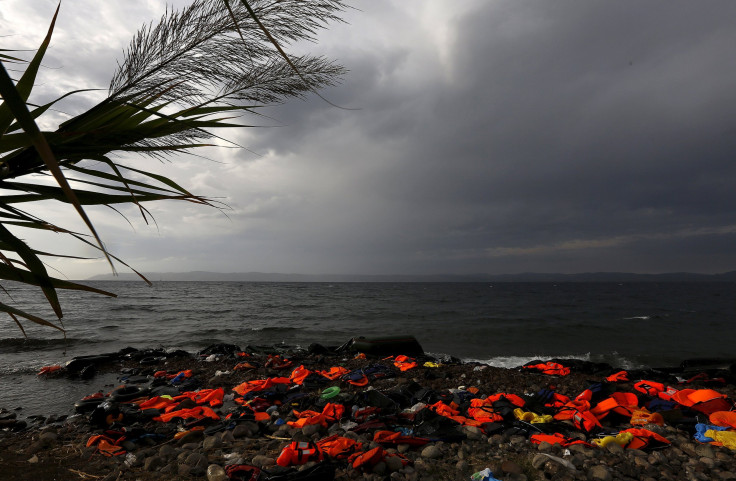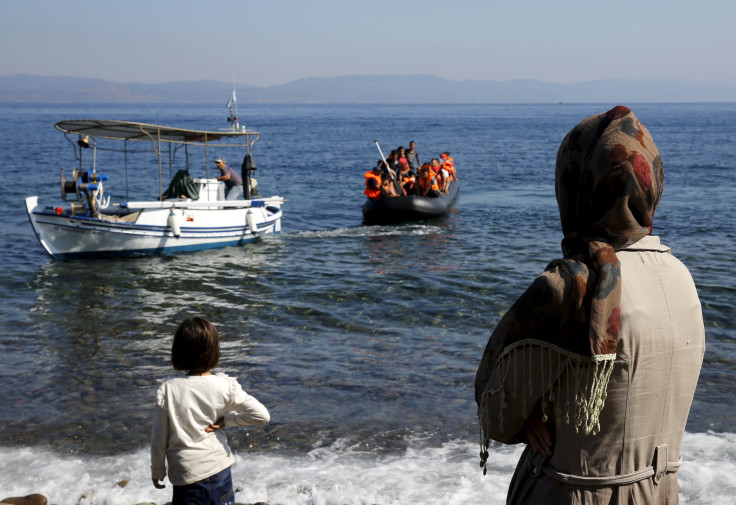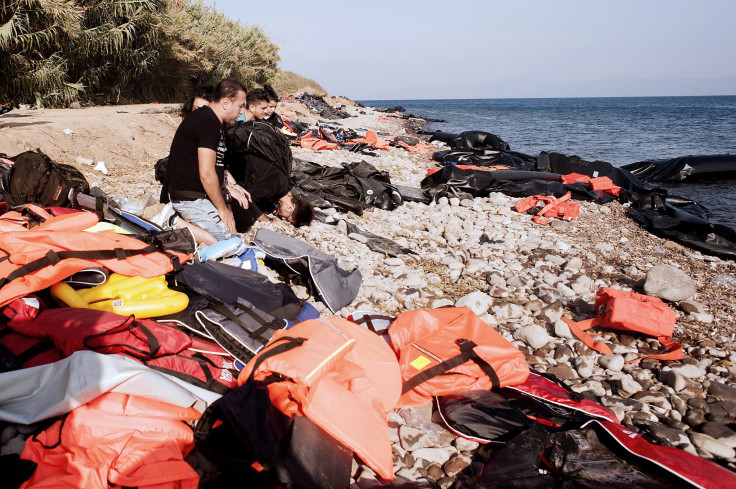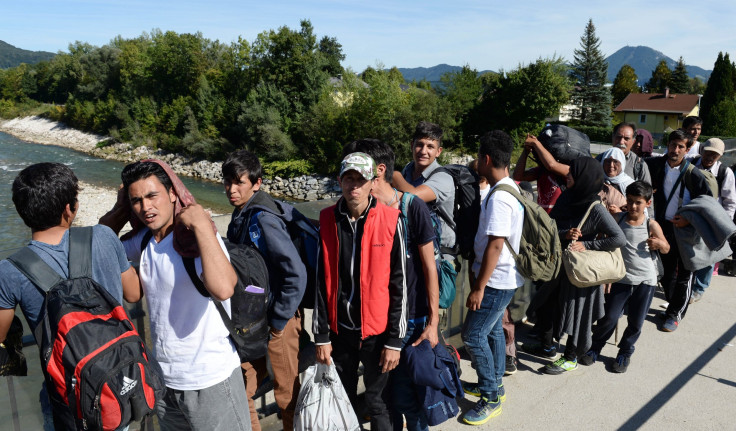Locals, Tourists And Refugees: Fear And Loathing On The Greek Island Of Lesbos

LESBOS, Greece -- “Look, look! The refugees are landing here,” the barmaid calls to a small group of tourists by the beachside pool, basking in the last sun of the day. An English couple springs up from their loungers, peering down to the coast below, where an excitable band of refugees is shrieking and whooping -- some with joy, others with fear -- as they half-fall, half-jump from a boat into the clear, stony water of the Aegean. The couple looks distinctly unimpressed. “More immigrants,” the two mutter to each other before picking up their towels and disappearing into the hotel.
The Greek island of Lesbos, long popular with European vacationers, now hosts more refugees than tourists. Since June, around 2,000 have arrived on the island every day, paying smugglers upward of 1,000 euros to ferry them across the narrow stretch of sea from the west coast of Turkey to the northern shores of Lesbos, from where the majority hope to journey on to Athens, through the Balkans and finally to Germany. More than half of the newcomers are Syrian, fleeing a brutal civil war with no end in sight. Afghans, Iraqis, Somalis and Eritreans make up the bulk of the rest.
Reactions to their arrival are mixed. Some tourists are taking time out of their vacations to volunteer -- handing out food and snacks at the roadside or meeting boats as they land. Other would-be visitors have decided not to come at all. Many locals are worried about the effect on tourism.

Nikos is a taxi driver. Originally from the Greek capital of Athens, he moved to Lesbos five years ago, preferring the slower pace of life and the picturesque surroundings. As with the majority of Lesbos residents, his work is seasonal. Summer months are the busiest, when the tourist season is at its height. During the winter, he picks olives from the island’s bounty of olive groves, which produce the delicately flavored olive oil for which the island is famous. He then returns home to his family in Athens for several months at a time. Nikos was willing to talk to International Business Times on the condition that his last name wasn’t used -- most locals are wary of speaking to foreign media, fearing their words will be misconstrued as racist.
Refugees, he said, are not good for business. “People don’t like it. [The refugees] make the tourists leave. We were fully booked for September. Now the hotels are empty.” Nikos thinks the effects could be catastrophic. “We need tourism," he said. "This is what the island runs on. Without tourism, we cannot live.” This sentiment is common, one that’s whispered across bars, hotels and restaurants. “They are sinking our island,” Nikos’ co-worker told IBT.
There’s a lot of fearmongering. “The locals are scared that when the winter comes the refugees will come into their homes,” Nikos said.
Lesbos is an island of 80,000 people and, Nikos admits, there’s a pervading village mentality. “The people here don’t like strangers," he said. "They don’t like people from the next village. They don’t trust you if you’re from outside, even if you’re Greek.”
Many locals are suspicious of the refugees, whom they consider interlopers. “Why are there all these men? So many more men. What happens to their women? What do they do with them?” asks a local customer in a souvlaki joint, eyeing the line of hungry Syrian youths jostling one another as they wait impatiently for their skewered meat and pita bread.

Another complaint -- from locals and tourists alike -- is the garbage refugees leave behind. One main road connects the villages of Eftalou and Molyvos, where the refugees first arrive, to the port city of Mytilene, from where ferries to Athens leave. For the past few weeks, the International Rescue Committee has organized four buses a day to take refugees to the port, but this is not enough to keep up with demand, and fights regularly break out between new arrivals desperate for a place on board.
Many, having no other choice, walk through the night. Whole families can be observed walking the undulating route -- small infants in their mothers’ arms and children by their side. Behind them, a trail of detritus follows: empty water bottles, biscuit wrappers, disposable diapers, discarded shoes and sweaters.
“What people don’t realize,” Nikos said, “is that someone has to clean this up. We didn’t have this mess before. Now our garbage collectors are always busy, and there is still this mess.”
Sophie, a tourist from Sweden and an annual visitor to Lesbos for many years, confided, “I feel sorry for [the refugees]. I really do. But the rubbish they leave is unbelievable. Why can’t they put their rubbish in garbage bags like everyone else?”
But not everyone shares their views. Nadinne Bilu has lived on the island for 10 years, having moved here with her Greek husband and two young sons. Now divorced, she works as a waitress at a hotel by Eftalou beach earning 300 euros a month.

She grew up one of six siblings in the city of Goma in the Democratic Republic of the Congo, which borders the Rwandan city of Gisenyi. Her mother, a member of the Tutsi ethnic group, could do nothing as her entire extended family was murdered in the Rwandan genocide a few miles from their home. After Nadinne’s father, an engineer, died when she was 13, the family was plunged into poverty. Bilu would wash the dishes at a family friend’s restaurant so she could earn enough money to go to high school. She shared a uniform with her sister.
When Bilu looks at the refugees by the roadside, she sees herself. “I look at the women and the children, and I know how they feel,” she said. Bilu doesn’t think the garbage left by the refugees is a big issue. “So what?" she said. "These people are leaving war. They can only take what they carry on their backs.”
Bilu regularly offers rides to female refugees and gives water and snacks to their children. She rebukes those who don’t help.
“I say to them, ‘The situation in Greece is getting worse and worse,'" Bilu said. "'Don’t be so sure you won’t end up like them.’”
© Copyright IBTimes 2024. All rights reserved.






















